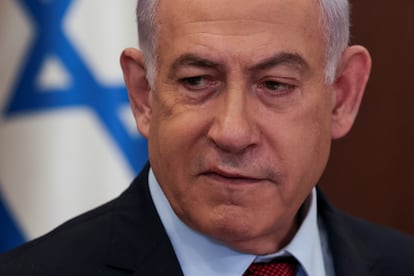Fed up with Netanyahu
The prime minister of Israel and the president of Russia are both discredited in the eyes of the international community; the former is protected in the U.N. Security Council by the U.S. veto, and the latter by his own

The end is in sight. Of war and of Netanyahu. War unites and peace divides, according to Shlomo Ben Ami, who was Minister of Foreign Affairs and Israel’s ambassador to Spain. Israelis are rallying around the government over Hamas, but their opinions diverge when it comes to what to do about Gaza. That is why Netanyahu clings to the war. The definitive ceasefire is his defeat. Not military, but political. The military victory has already been achieved, but it is merely a tactical one. It does not exclude strategic or political defeat, as the United States Secretary of Defense, Lloyd Austin, has reminded him. As soon as the guns fall silent, it will be time for him to leave. He must be held accountable for his negligence as a government leader and for his erroneous strategy in the conflict with the Palestinians. His government will fall, an inquiry will be opened, there will be elections.
The war has already reached its climax. The terrorist organization has no strength left to repeat an attack like the one it perpetrated on October 7 and barely any to continue firing its rudimentary missiles. Hamas spent everything it had on that bloody day, with which it obtained 200 hostages, and lost the rest in the two months of invasion.
Now Joe Biden is showing Israel the way out. Its extremist government is dead weight. The indiscriminate bombings must stop and those who do not want to fight Hamas but rather to continue punishing the Palestinians must be thrown out of the cabinet. Without ending its diplomatic support or its supply of weapons, the United States has been telling Netanyahu this from day one, first privately, then quietly, now loudly and clearly. Biden is a master of empathy. He hugs like no one else. But neither does he spare the reproaches, clear and gentle in form, very harsh in their substance: Israel is isolating itself internationally, something that also harms the United States. Right around the same time, the United Nations General Assembly demonstrated this with the ceasefire demanded by 153 countries, 23 more than those that voted in favor of the truce on October 26, and above the 141 that condemned Russia for the invasion of Ukraine. Netanyahu and Putin are twinned and both are discredited in the eyes of the international community, the former protected in the Security Council by the United States veto and the latter by his own.
The release of the hostages is the burning issue. The longer the war lasts, the harder it will be to get them back alive. Hamas is holding on to them because it seeks popularity among the Palestinians and a political victory through the exchange. That is why the credit for their rescue should go to the Palestinian Authority. This would open the doors to its management of Gaza when the weapons fall silent. But it will only happen if in exchange it receives a peace plan like Oslo and the recognition of the Palestinian state. This is exactly what Netanyahu has just repudiated, clinging to war, that is, to power, because he has no ideas or any desire for peace.
Sign up for our weekly newsletter to get more English-language news coverage from EL PAÍS USA Edition
Tu suscripción se está usando en otro dispositivo
¿Quieres añadir otro usuario a tu suscripción?
Si continúas leyendo en este dispositivo, no se podrá leer en el otro.
FlechaTu suscripción se está usando en otro dispositivo y solo puedes acceder a EL PAÍS desde un dispositivo a la vez.
Si quieres compartir tu cuenta, cambia tu suscripción a la modalidad Premium, así podrás añadir otro usuario. Cada uno accederá con su propia cuenta de email, lo que os permitirá personalizar vuestra experiencia en EL PAÍS.
¿Tienes una suscripción de empresa? Accede aquí para contratar más cuentas.
En el caso de no saber quién está usando tu cuenta, te recomendamos cambiar tu contraseña aquí.
Si decides continuar compartiendo tu cuenta, este mensaje se mostrará en tu dispositivo y en el de la otra persona que está usando tu cuenta de forma indefinida, afectando a tu experiencia de lectura. Puedes consultar aquí los términos y condiciones de la suscripción digital.









































